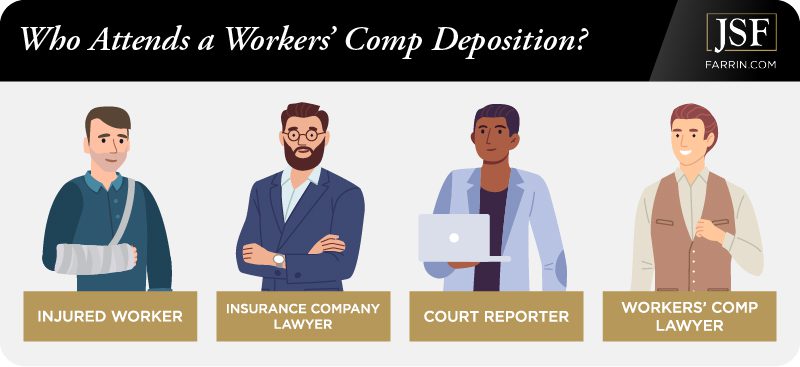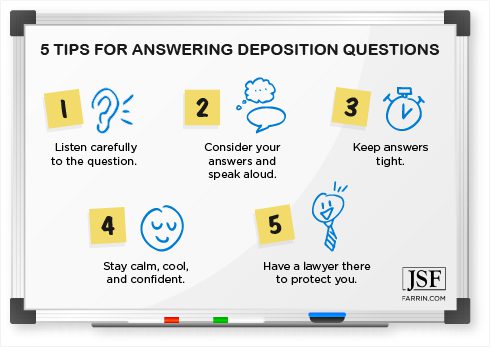If you were hurt on the job in South Carolina, you might be surprised to know that a deposition is probably in your future. This is especially true if you have suffered a permanent injury.
Put simply, a deposition is testimony that doesn’t take place in court. That’s it.
For a bit more context, the exchange of evidence from other parties in a case is called “discovery” in South Carolina. As part of the discovery process, both parties are allowed to obtain sworn testimony from witnesses via depositions.
While simple to define, discovery depositions can be minefields for your case. It’s preferable to have an experienced workers’ compensation attorney in your corner for them. Your attorney prepares you thoroughly and is in the room with you.
Here’s how it all works and what you can expect.
Who Attends a Workers’ Comp Deposition?
At its core, a deposition is legal testimony given under oath and in the presence of a court reporter. A judge, commissioner, or whomever is hearing the case can later consider the deposition as evidence.
There will be at least three people in a workers’ comp deposition (and a recommended fourth):
WITNESS: Such as you, the injured worker. You’re there to answer questions and explain your position.
LAWYER 1: The insurance company’s attorney is there to ask you or another witness questions. This attorney will be polite but is not on your side.
COURT REPORTER: This person is present to make a verbatim record of both the questions and the answers from the deposition.
LAWYER 2: If you’ve hired a workers’ compensation lawyer to represent you, they’ll be present to help protect your rights and advocate for you.
In-Person vs. Remote Deposition Testimony
Some people prefer in-person depositions if possible, and South Carolina law also allows for remote depositions. South Carolina Rule 30(b)(7) allows for audio and visual or audio-only depositions. Generally, both sides agree to the means of the deposition.
The Workers’ Comp Deposition, Step-By-Step
So, you know what a deposition is and who’s going to be present. How does it happen? Here are the 3 steps in the deposition process and what to do at each.
Step 1: Prepare

To prepare, you should refresh your memory on the details of the incident, the treatments you received, how you felt, and so on. Go over your medical records, medical treatment, and any other evidence concerning your work accident.
Once there is an agreement on schedule and location for your deposition, you’re ready to proceed.
NOTE: Depositions vs. Recorded Statements
You may have heard about giving a recorded statement to the adjuster after your accident. Typically, a recorded statement is requested in the early stages of the claim by the insurance carrier. A deposition is normally not taken unless there is a pending Request for Hearing before the South Carolina Workers’ Compensation Commission, the agency in charge of administering workers’ comp in the state.
We recommend against giving a recorded statement to an insurance company – it can be used as evidence. And we urge you to have your lawyer present to help protect your rights at a deposition.
Step 2: Attend the Deposition

Step 3: Protect Your Case Under Questioning
The insurance company’s attorney can ask about anything related to your case, including:
- Background information like your name, date of birth, address, education, and work history, as well as any criminal history or prior workers’ compensation claims
- Prior injuries and medical history, possibly in an attempt to find out if your injury is actually a preexisting condition (though that does not necessarily matter in a workers’ compensation case)
- Facts about the injury in question, how it happened, who was present, and sometimes even more invasive questions – especially if your claim is centered on an occupational illness
- Medical treatment, from the medical care you got right after the injury to the treatments you’re receiving currently, including chiropractic care, physical therapy, surgeries, and so on
- Current work limitations based on the medical evidence, your work history, and generally anything else that may be relevant to your work injury
How to Answer Questions in a Workers’ Compensation Deposition: 5 Tips
1) Listen carefully to the question. Wait until the lawyer finishes asking. You want to answer the question they ask, not the one you think they’re asking.
You also want to give your lawyer, if you have one, time to object or otherwise react to the question. If you do not completely understand the question, ask for clarification.
2) Consider your answers and speak aloud. Don’t just nod or shake your head in response; say “Yes,” or “No.” Similarly, instead of pointing to your right leg, say, “My right leg.”
You don’t want to leave room for a judge or commissioner to misunderstand you.
3) When you’re answering questions, keep it tight. Don’t give long-winded answers that share too much information. You want to answer the question you were asked and nothing else! And you need not share confidential information – your attorney will go through that with you.
If the answer is yes or no, that’s all you need to say. Avoid giving specific numbers (like the number of days you felt a certain way) unless you know them with certainty and your attorney recommends it.
You should always answer truthfully. If you don’t know the answer to a question, say so. Making a misleading statement could harm your case or in severe cases, result in a perjury charge.
4) Stay calm, cool, and confident. The insurance company’s attorney may be evaluating your credibility as a witness, imagining how you’ll do in front of the South Carolina Workers’ Compensation Commission (SCWCC) in a hearing. Be courteous and keep an even temper.
There may be questions that “push your buttons” and make you feel agitated. Your lawyer can intervene if that happens. Don’t let them seize on an emotional reaction.
5) Have a lawyer there to protect you. The insurance company lawyer isn’t on your side, and while they may be polite, their questions can be tricky or infuriating. A lawyer can object to any inappropriate questions and help protect your best interests.
What Happens When the Deposition Is Over?
Once you have answered all the questions and your lawyer has asked any follow-up questions, the deposition ends. The court reporter will complete their record, and a written transcript of the deposition is sent to the injured worker (and to your lawyer if you have one) and the insurance company.
The judge or commissioner from the SCWCC will refer to your deposition while reviewing and making decisions on your workers’ compensation case. Deposition testimony “sticks to you,” so to speak, and it is hard to change what you’ve testified to under oath.
This is another reason it is vital to prepare with an experienced attorney before giving a deposition.
The deposition is part of the record, and even if your case is appealed, it remains part of the evidence. For example, if your case goes all the way to the full South Carolina Workers’ Compensation Commission, your deposition is still considered evidence. Even in the highly unlikely event that your case goes to a court of appeals, the deposition is still relevant.
Call Our Experienced Workers’ Compensation Attorneys
Your workers’ comp claim can be vital to your present and future. Don’t take chances. Our workers’ compensation team knows how the system works and can help you navigate the law, file forms correctly, and fight for your best interests – from the initial claim all the way to resolution.

We have extensive “other side” experience: Several of our attorneys are former defense attorneys for insurance companies.
Put our knowledge and experience on your side. We can advise you, take a lot of stress off your plate, and prepare you to testify in your deposition. Call us at 1-866-900-7078 or contact us online today for a free case evaluation.









